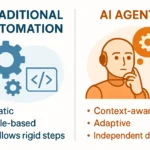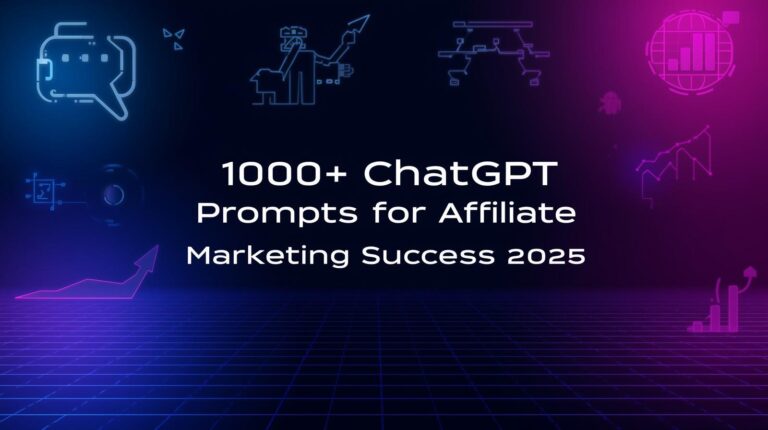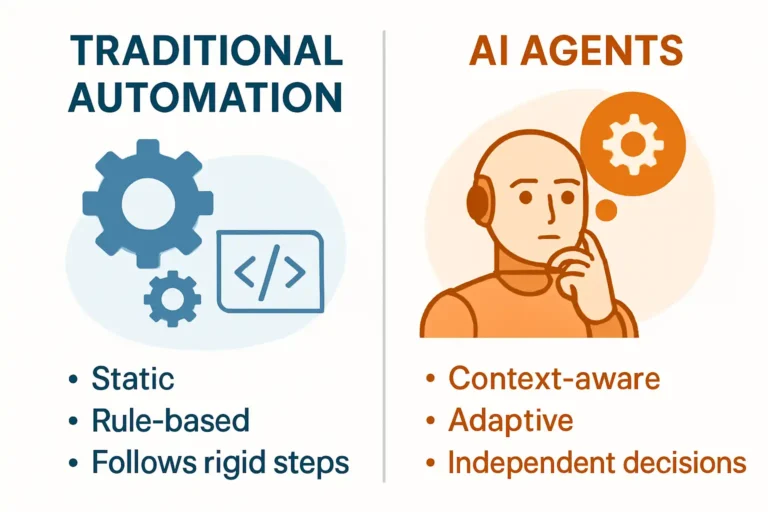Summary Of The Ultimate Guide to the 51 Best AI Tools
The article “The Ultimate Guide to the 51 Best AI Tools for Digital Marketing Success” explores how AI is transforming digital marketing by enhancing efficiency, personalization, and data analysis. It highlights the benefits of AI tools, such as increased productivity, improved data insights, and scalability. The guide lists top AI tools across various categories, including keyword research, content creation, social media management, email marketing, and more. Each tool is evaluated based on its features, pros, and cons, helping marketers choose the right tools for their needs. The article emphasizes the importance of selecting AI tools that align with specific marketing goals, integration capabilities, and budget considerations to maximize digital marketing success.
Introduction to AI tools for digital marketing
In the ever-evolving landscape of digital marketing, staying ahead of the curve is crucial for success. As technology continues to advance, Artificial Intelligence (AI) has emerged as a game-changer, offering powerful tools that can streamline processes, enhance efficiency, and drive better results. In this comprehensive guide, we'll explore the 51 best AI tools that can revolutionize your digital marketing strategy, empowering you to achieve unprecedented success.
The integration of AI in digital marketing has opened up a world of possibilities, enabling marketers to automate tasks, personalize campaigns, and gain valuable insights. By leveraging the power of machine learning and advanced algorithms, these AI tools can analyze vast amounts of data, identify patterns, and make data-driven decisions, ultimately leading to more effective and targeted marketing efforts.
Benefits of using AI tools in digital marketing
Before diving into the list of AI tools, let's explore the key benefits of incorporating AI into your digital marketing strategy:
- Increased Efficiency and Productivity: AI tools can automate repetitive tasks, freeing up valuable time for marketers to focus on more strategic initiatives.
- Enhanced Data Analysis: With the ability to process vast amounts of data quickly and accurately, AI tools provide valuable insights that can inform data-driven decision-making.
- Improved Personalization: AI algorithms can analyze customer behavior and preferences, enabling highly personalized marketing campaigns that resonate with your target audience.
- Predictive Analytics: By identifying patterns and trends, AI tools can help predict customer behavior, allowing you to stay ahead of the curve and make proactive decisions.
- Scalability: AI tools can seamlessly handle increasing workloads and data volumes, ensuring your marketing efforts remain efficient and effective as your business grows.
Overview of the 51 best AI tools for digital marketing
To help you navigate the vast array of AI tools available, we've curated a list of the 20 best AI tools for digital marketing success. Each tool has been carefully selected based on its capabilities, user-friendliness, and proven track record in delivering outstanding results.
AI tools for keyword research and SEO optimization
Semrush
This comprehensive SEO tool leverages AI to provide valuable insights into keyword research, competitor analysis, and on-page optimization.
Semrush is a comprehensive digital marketing tool that excels in SEO, PPC, social media, and content marketing. It offers a robust Keyword Magic Tool for extensive keyword suggestions and insights, making it invaluable for developing effective keyword strategies. Semrush also provides detailed competitor analysis, helping users understand competitors' strategies, traffic sources, and keyword rankings. Its user-friendly interface makes it accessible for beginners, though its pricing can be a barrier for smaller businesses.
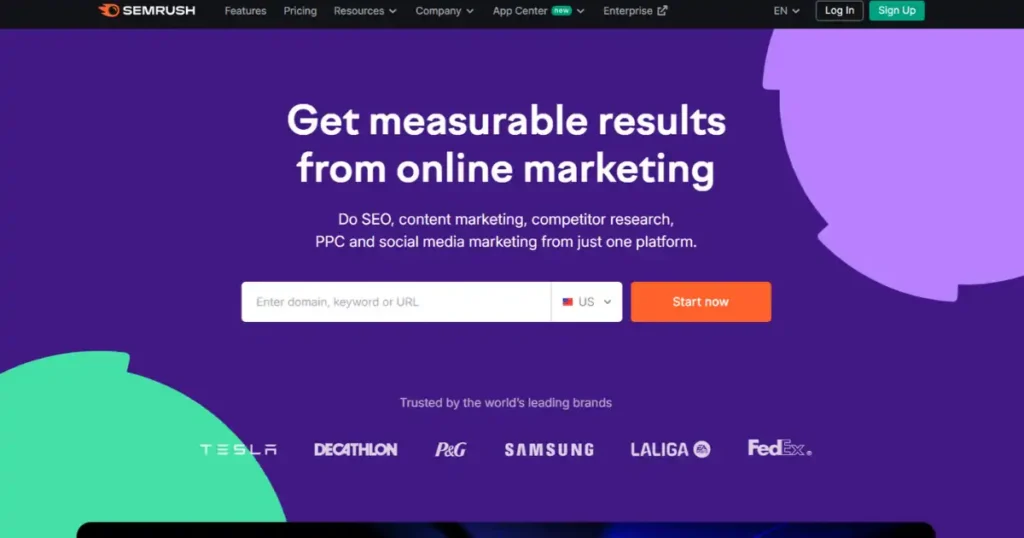
Pros:
- Comprehensive Features: Semrush offers a wide range of tools for SEO, PPC, social media, and content marketing, making it a one-stop solution for digital marketers.
- Keyword Magic Tool: This feature provides extensive keyword suggestions and insights, helping users identify the best keywords for their strategy.
- Competitor Analysis: Semrush excels in competitor analysis, offering detailed insights into competitors' strategies, traffic sources, and keyword rankings.
- User-Friendly Interface: The platform is intuitive and easy to navigate, even for beginners.
Cons:
- Pricing: Semrush can be expensive, especially for small businesses or freelancers with limited budgets.
- Data Overload: The sheer volume of data and features can be overwhelming for new users, requiring a learning curve to fully utilize its capabilities.
Ahrefs
Known for its powerful keyword research capabilities, Ahrefs uses AI to analyze backlinks, track rankings, and identify content gaps.
Ahrefs is renowned for its powerful backlink analysis capabilities, offering detailed reports on backlink profiles and link-building opportunities. Its Keyword Explorer provides comprehensive keyword research, including search volume, keyword difficulty, and click-through rates. Ahrefs also excels in content gap analysis, helping users identify opportunities for content creation. While it is a premium tool, its focus on SEO makes it less suitable for those seeking social media analytics.
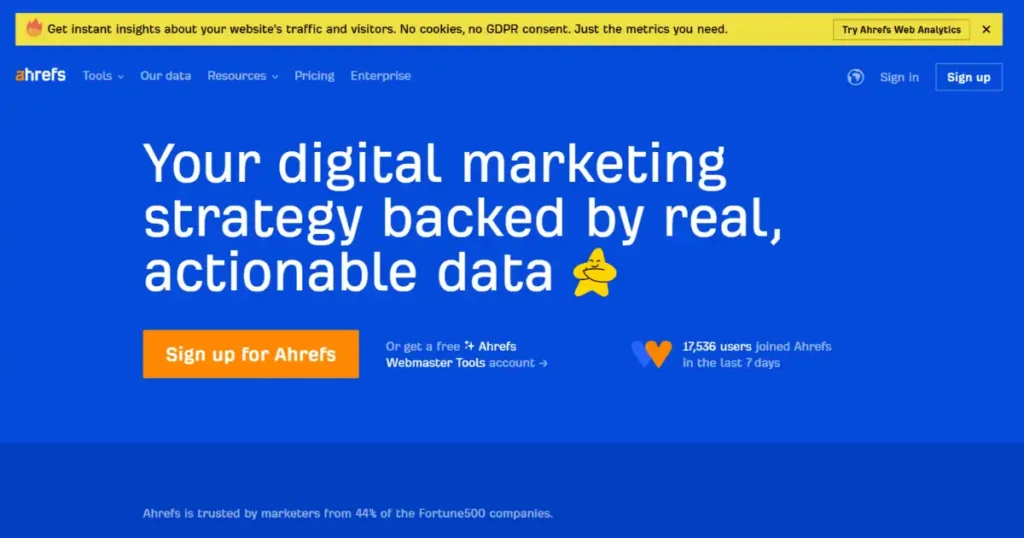
Pros:
- Backlink Analysis: Ahrefs is renowned for its robust backlink analysis, providing detailed reports on backlink profiles and link-building opportunities.
- Keyword Explorer: This tool offers comprehensive keyword research capabilities, including search volume, keyword difficulty, and click-through rates.
- Content Gap Analysis: Ahrefs helps identify content gaps by comparing your site with competitors, offering opportunities for content creation.
- Rank Tracking: Users can track keyword rankings over time, gaining insights into their SEO performance.
Cons:
- Cost: Like Semrush, Ahrefs is on the pricier side, which may not be feasible for smaller businesses.
- Limited Social Media Tools: Ahrefs focuses primarily on SEO and lacks comprehensive social media analytics.
You May Also Like: Best AI-Powered Documentation Tools To Boosting Efficiency
Moz Pro
Combining AI with expert-level data, Moz Pro offers valuable insights into technical SEO, keyword research, and link building.
Moz Pro combines AI with expert-level data to offer insights into technical SEO, keyword research, and link building. Its Page Optimization and Keyword Explorer tools help improve site SEO health and develop effective keyword strategies. Moz Pro’s Link Explorer aids in identifying link-building opportunities. Although some users find its interface less intuitive, Moz's strong community and educational resources provide valuable support for users.
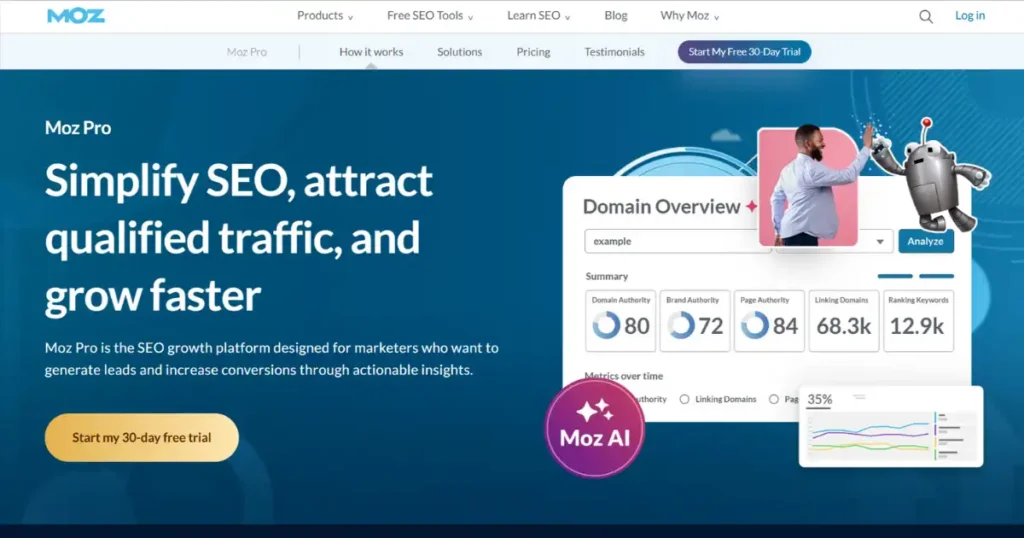
Pros:
- Page Optimization: Moz Pro offers tools for on-page optimization, helping users improve their site’s SEO health.
- Keyword Explorer: This feature provides keyword suggestions, search volume, and difficulty scores, aiding in effective keyword strategy.
- Link Explorer: Moz Pro’s link analysis tool helps identify link-building opportunities and track link metrics.
- Community and Resources: Moz offers a strong community and educational resources, including the Moz Blog and Whiteboard Fridays.
Cons:
- Interface: Some users find the interface less intuitive compared to competitors, which can be a barrier for new users.
- Data Freshness: There have been concerns about the freshness and accuracy of Moz’s data compared to other tools like Ahrefs.
AI tools for content creation and optimization
Jasper.ai
Jasper.ai is an AI-powered writing assistant that can generate high-quality content, including blog posts, social media updates, and marketing copy.
Jasper.ai is an AI-powered writing assistant designed to generate high-quality content across various formats, including blog posts, social media updates, and marketing copy. It uses natural language processing to understand context and produce coherent, engaging text. Jasper.ai is particularly useful for marketers and content creators looking to streamline their content production process. However, while it excels in generating initial drafts, users may need to refine the output to ensure it aligns with their brand voice and style.
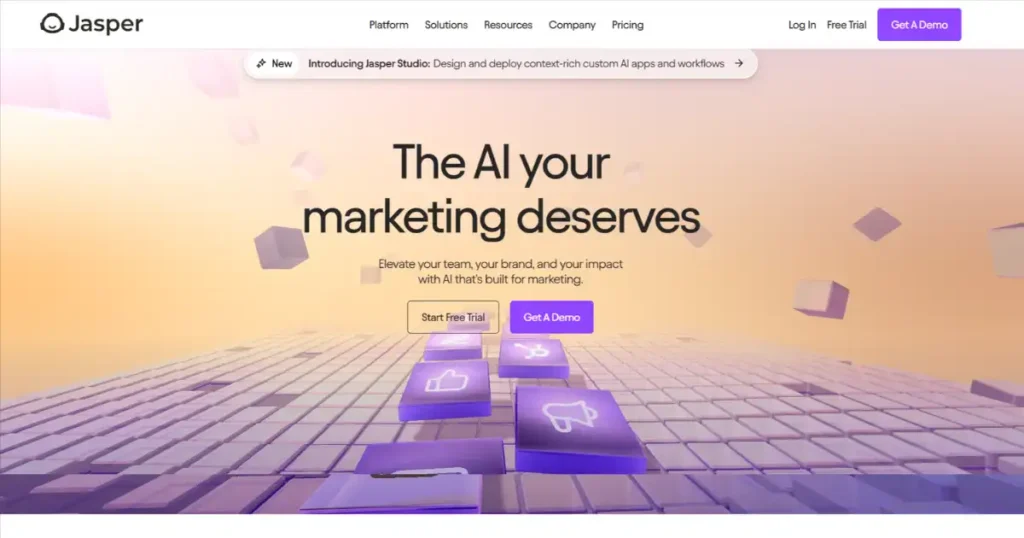
Pros
- Versatile Content Generation: Jasper.ai can create a wide range of content, from blog posts to marketing copy, making it a versatile tool for content creators.
- Time-Saving: It significantly reduces the time needed to produce content, allowing users to focus on other tasks.
- User-Friendly Interface: The platform is easy to use, even for those with limited technical skills.
Cons
- Output Refinement Needed: While Jasper.ai generates coherent content, users often need to refine the output to align with their brand voice.
- Cost: The tool can be expensive for small businesses or freelancers.
Grammarly
While not exclusively an AI tool, Grammarly leverages AI to provide advanced writing suggestions, grammar checks, and plagiarism detection.
Grammarly is a widely-used writing enhancement tool that leverages AI to offer advanced writing suggestions, grammar checks, and plagiarism detection. It helps users improve their writing by providing real-time feedback on grammar, punctuation, and style. Grammarly is beneficial for writers of all levels, from students to professionals, aiming to produce clear and error-free content. While it is not exclusively an AI tool, its AI-driven insights significantly enhance writing quality, though it may occasionally miss nuanced language or stylistic preferences.
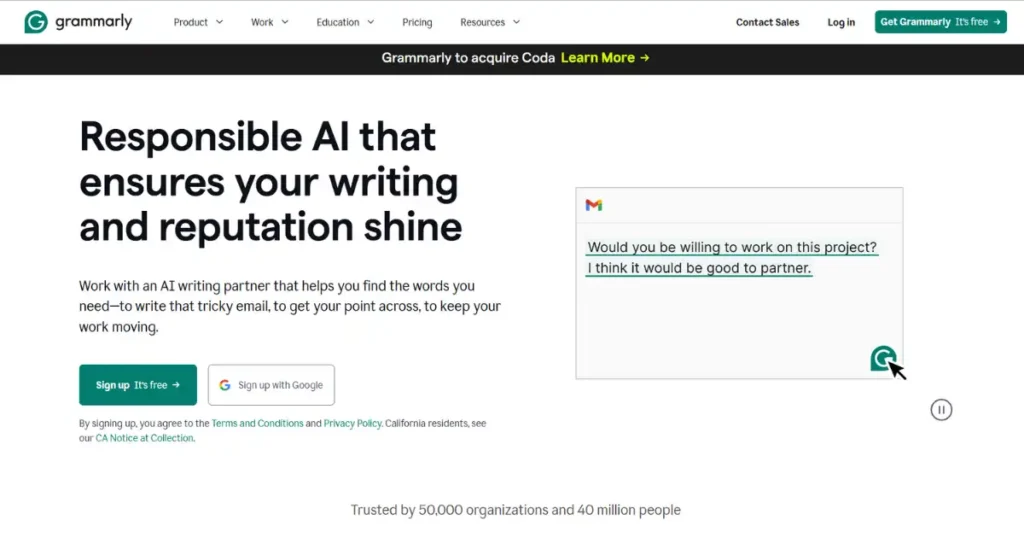
Pros
- Comprehensive Writing Assistance: Grammarly offers advanced grammar checks, style suggestions, and plagiarism detection, enhancing overall writing quality.
- Real-Time Feedback: It provides instant feedback, helping users improve their writing on the go.
- Wide Accessibility: Available as a browser extension, desktop app, and mobile app, making it accessible across devices.
Cons
- Limited Style Customization: It may not always align with specific stylistic preferences or nuanced language.
- Subscription Cost: While it offers a free version, the premium features require a subscription.
Frase.io
This AI-powered content optimization platform helps you create SEO-friendly content by analyzing top-ranking pages and providing data-driven insights.
Frase.io is an AI-powered content optimization platform that assists in creating SEO-friendly content. It analyzes top-ranking pages to provide data-driven insights, helping users optimize their content for better search engine performance. Frase.io is ideal for content creators and SEO professionals seeking to improve their content's visibility and relevance. While it offers valuable insights, users may need to combine its suggestions with their expertise to achieve the best results.
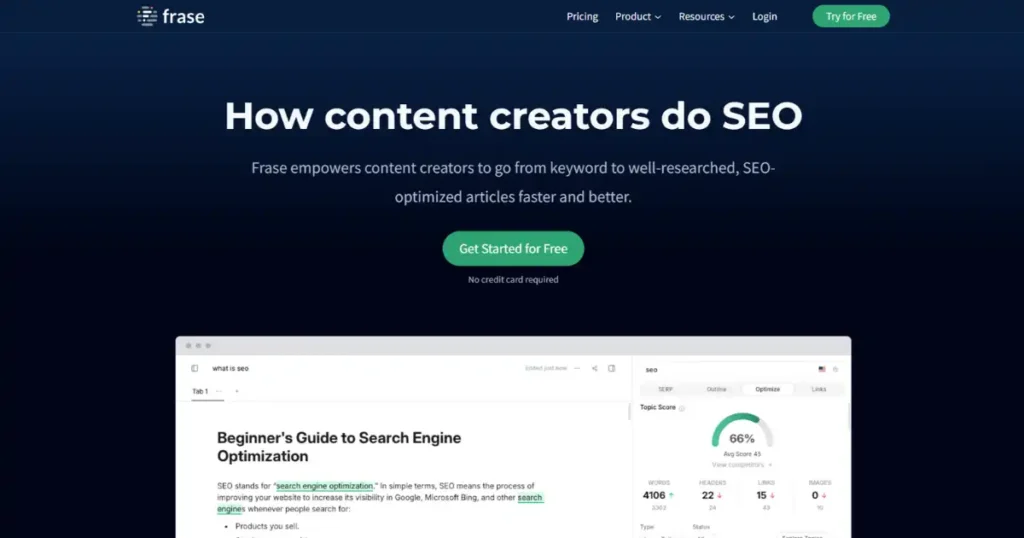
Pros
- SEO Optimization: Frase.io provides data-driven insights to help create SEO-friendly content, improving search engine visibility.
- Content Analysis: It analyzes top-ranking pages to offer valuable optimization suggestions.
- User-Friendly: The platform is designed to be intuitive and easy to navigate.
Cons
- Dependence on User Expertise: Users may need to combine Frase.io's suggestions with their expertise for optimal results.
- Pricing: The cost may be a consideration for smaller teams or individual users.
AI tools for social media management and automation
Hootsuite
Hootsuite's AI-powered features include content suggestions, sentiment analysis, and automated scheduling for optimal engagement.
Hootsuite is a leading platform among the best AI tools for digital marketing, offering robust social media management features. Its AI-powered capabilities include content suggestions, sentiment analysis, and automated scheduling, which help optimize engagement across multiple social media platforms. Hootsuite's content suggestions aid in curating relevant posts, while sentiment analysis provides insights into audience reactions, crucial for digital marketing strategies. Automated scheduling ensures posts are published at optimal times, maximizing reach and engagement. Ideal for businesses and individuals managing multiple accounts, Hootsuite streamlines social media efforts, making it a top choice for digital marketers.
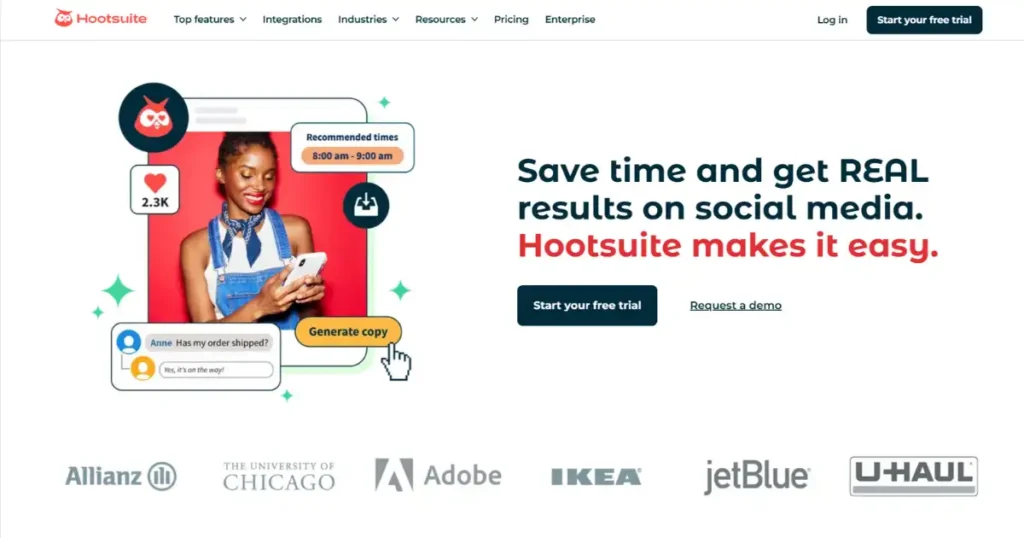
Pros
- Comprehensive Features: Offers a wide range of tools for managing social media accounts.
- Automated Scheduling: Ensures posts are published at the best times for engagement.
- Sentiment Analysis: Provides insights into audience reactions and engagement.
Cons
- Complexity: The platform can be overwhelming for new users due to its extensive features.
- Cost: Pricing may be a barrier for small businesses or freelancers.
Sprout Social
This comprehensive social media management tool uses AI to provide valuable insights into audience behavior and sentiment.
Sprout Social stands out as one of the best AI tools for digital marketing, providing comprehensive social media management and audience insights. Its AI-driven features include social listening, analytics, and engagement tools, which help businesses understand audience behavior and tailor content effectively. Sprout Social's detailed analytics and social listening capabilities make it invaluable for brands looking to enhance their digital marketing strategies through data-driven insights.
Pros
- Detailed Analytics: Provides in-depth insights into audience behavior and engagement.
- Social Listening: Helps monitor brand mentions and sentiment across platforms.
- User-Friendly Interface: Easy to navigate, even for beginners.
Cons
- Pricing: Can be expensive, especially for smaller teams.
- Learning Curve: Some features may require time to master.
You May Also Like: 15 Best AI Tools for Business
Buffer
With its AI-powered content suggestions and scheduling capabilities, Buffer streamlines social media management and engagement.
Buffer is a social media management tool that streamlines content scheduling and engagement. Its AI-powered content suggestions help users curate relevant posts, while scheduling capabilities ensure consistent posting. Buffer is known for its simplicity and ease of use, making it a great choice for individuals and small businesses looking to manage their social media presence efficiently.
Pros
- Ease of Use: Simple and intuitive interface, ideal for beginners.
- Content Suggestions: Helps in curating relevant and engaging posts.
- Affordable: Offers competitive pricing for small businesses and individuals.
Cons
- Limited Features: Compared to competitors, Buffer may lack some advanced features.
- Basic Analytics: Provides less detailed analytics compared to other tools.
AI tools for email marketing and lead generation
HubSpot
HubSpot's AI-powered tools include lead scoring, email personalization, and predictive lead scoring for more effective lead nurturing.
HubSpot is a leading contender among the best AI tools for digital marketing, offering a suite of AI-powered features that enhance lead management and customer engagement. Its AI capabilities include lead scoring, email personalization, and predictive lead scoring, which help in more effective lead nurturing. HubSpot's lead scoring uses AI to prioritize leads based on their likelihood to convert, while email personalization tailors content to individual preferences, boosting engagement rates. Predictive lead scoring further refines this process by analyzing historical data to forecast future behaviors. These features make HubSpot an essential tool for marketers aiming to optimize their digital marketing strategies.
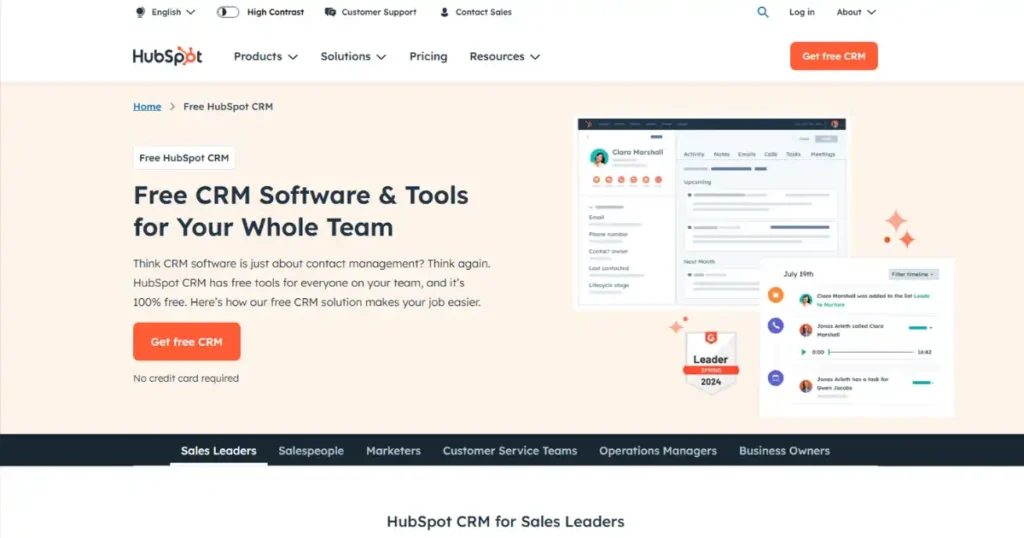
Pros
- Comprehensive Features: Offers a wide range of tools for lead management and customer engagement.
- Predictive Analytics: Enhances lead scoring and prioritization.
- User-Friendly Interface: Intuitive and easy to use.
Cons
- Cost: Can be expensive for small businesses or startups.
- Complexity: May require time to fully utilize all features.
Mailchimp
Mailchimp's AI features include subject line optimization, content recommendations, and automated segmentation for targeted email campaigns.
Mailchimp is renowned as one of the best AI tools for digital marketing, particularly in email marketing. Its AI features include subject line optimization, content recommendations, and automated segmentation, which enhance the effectiveness of targeted email campaigns. Mailchimp's subject line optimization uses AI to suggest impactful headlines, while content recommendations tailor email content to recipient preferences. Automated segmentation ensures that emails reach the right audience, increasing engagement and conversion rates.
Pros
- Ease of Use: Simple interface, ideal for beginners.
- Effective Segmentation: Enhances targeted email campaigns.
- Affordable: Offers competitive pricing for small businesses.
Cons
- Limited Advanced Features: May lack some advanced capabilities compared to competitors.
- Basic Analytics: Provides less detailed analytics.
Drift
This conversational marketing platform leverages AI to provide personalized chatbot experiences and qualify leads more effectively.
Drift is a conversational marketing platform recognized among the best AI tools for digital marketing, leveraging AI to deliver personalized chatbot experiences. Its AI-driven chatbots engage website visitors, qualify leads, and provide real-time responses, enhancing customer interaction. Drift's ability to qualify leads effectively makes it a valuable tool for businesses seeking to streamline their sales funnel and improve customer experience.
Pros
- Personalized Engagement: Offers tailored chatbot interactions.
- Lead Qualification: Effectively identifies potential leads.
- Real-Time Responses: Enhances customer interaction.
Cons
- Integration Complexity: May require technical expertise for seamless integration.
- Pricing: Can be costly for smaller businesses.
AI tools for data analytics and customer insights
Google Analytics
While not exclusively an AI tool, Google Analytics incorporates machine learning to provide valuable insights into customer behavior and website performance.
Google Analytics stands out as one of the top AI tools for digital marketing. It gives powerful insights into website traffic and how users act. Its AI features include predictive analytics and automated insights. These help marketers grasp complex data patterns and make choices based on data.
Good points:
- Full website analytics
- AI-driven insights and tips
- No cost for basic use
Cons
- Beginners might find it hard to use
- The free version has limits on up-to-date data
Tableau
Tableau's AI-powered features include natural language processing, predictive analytics, and automated data visualization.
Tableau stands out as a top tool for showing data . It uses AI to help marketers build dashboards that are both interactive and full of insights. Its AI features aid in getting data ready looking at it , and telling stories with it. This makes it easier to get useful insights from tricky sets of data.
Pros
- Strong ways to show data
- AI helps analyze data
- Easy-to-use layout
Cons
- Too pricey for small companies
- Takes time to learn all it can do
Salesforce Einstein
Salesforce Einstein is an AI-powered platform that provides predictive analytics, automated lead scoring, and personalized recommendations.
Salesforce Einstein is an AI-powered CRM tool that has an impact on predictive analytics automated lead scoring, and personalized recommendations. It stands out as one of the top AI tools to boost digital marketing helping companies enhance their sales and marketing processes.
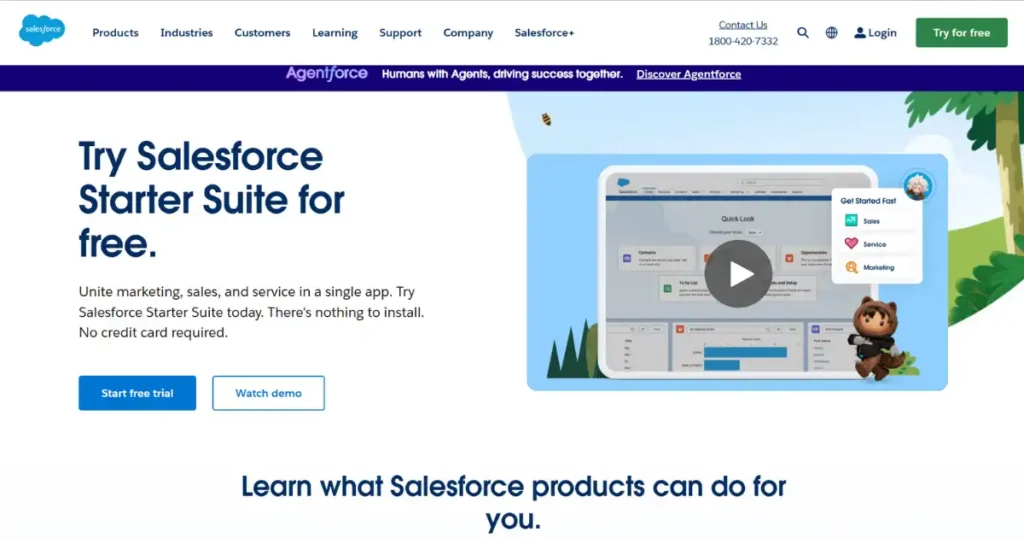
Pros
- Cutting-edge AI-driven insights
- Smooth integration with Salesforce ecosystem
- Adaptable for different industries
Cons
- Might be costly for small businesses
- Needs considerable setup and tweaking
You May Also Like: 10 Best AI Music Generators You Need to Explore in 2025
AI tools for PPC advertising and campaign optimization
Google Ads
Google's AI-powered features include smart bidding, audience targeting, and campaign optimization for improved ad performance.
Google Ads uses AI to improve ad placements, bidding strategies, and audience targeting. Its smart bidding and automated ad suggestions make it a standout among AI tools to enhance digital marketing in the PPC arena.
Pros
- AI optimizes bids
- Reaches far across Google’s network
- Gives detailed performance stats
Cons
- Might cost a lot in competitive fields
- New users find the interface hard to use
Acquisio
This AI-powered PPC management platform offers automated bidding, campaign optimization, and real-time reporting.
Acquisio uses AI to run and improve digital ad campaigns on many platforms. Its smart algorithms help marketers boost ROI by tweaking bids and budgets as things happen.
Pros
- Manages campaigns across platforms
- AI helps optimize budgets
- Saves time with automation
Cons
- Small businesses might find it pricey
- You need some know-how to use it well
Adstage
Adstage's AI capabilities include automated campaign creation, bid optimization, and real-time performance monitoring.
Adstage is a comprehensive platform that stands out among the best AI tools for digital marketing, particularly in the realm of advertising. Its AI capabilities include automated campaign creation, bid optimization, and real-time performance monitoring, which collectively enhance the efficiency and effectiveness of digital advertising efforts. Adstage's automated campaign creation streamlines the process of setting up ad campaigns across multiple platforms, saving marketers valuable time and effort. Bid optimization uses AI to adjust bids dynamically, ensuring that advertising budgets are used effectively to maximize ROI. Real-time performance monitoring provides marketers with up-to-the-minute insights into campaign performance, allowing for quick adjustments and data-driven decision-making. These features make Adstage a valuable tool for businesses looking to optimize their digital advertising strategies.
Pros
- Automated Campaign Creation: Simplifies the setup of ad campaigns across various platforms.
- Dynamic Bid Optimization: Ensures efficient use of advertising budgets.
- Real-Time Monitoring: Offers immediate insights for quick decision-making.
Cons
- Cost: May be expensive for smaller businesses or startups.
- Complexity: Requires some expertise to fully utilize all features.
AI tools for website design and optimization
Wix ADI
Wix's AI-powered website builder, ADI (Artificial Design Intelligence), creates personalized websites based on your business and preferences.
Wix ADI (Artificial Design Intelligence) is an AI-powered website builder that builds personalized websites based on what users input. It’s one of the top AI tools to help small businesses with digital marketing as they try to set up an online presence .
Pros
- Fast and simple website creation
- AI-generated designs and content ideas
- Templates that work well on mobile devices
Cons
- Not as much customization as traditional website builders offer
- Might not work for websites with complex needs
Unbounce
Unbounce's AI-powered features include smart traffic optimization, automated A/B testing, and personalized landing page recommendations.
Unbounce uses AI to make landing pages better and increase conversion rates. Its Smart Traffic feature sends visitors to the landing page version that fits them best, which boosts how well campaigns perform overall.
Pros
- A/B testing and optimization powered by AI
- Builder that’s easy to use with drag-and-drop features
- Works with popular marketing tools
Cons
- High-traffic websites might find it pricey
- Offers limited website features beyond landing pages
AI tools for chatbots and customer support
Drift
Mentioned earlier for its lead generation capabilities, Drift also offers AI-powered chatbots for personalized customer support and engagement.
Drift stands out as a platform for conversational marketing that uses AI to deliver personalized chatbot experiences. It’s among the top AI tools for digital marketing when it comes to qualifying leads and engaging customers in real time.
Pros
- Lead qualification powered by AI
- Engages visitors in real time
- Works with CRM systems
Cons
- Small businesses might find it expensive
- Might need significant setup to perform at its best
Intercom
Intercom's AI-powered chatbots can handle customer inquiries, provide personalized recommendations, and route complex issues to human agents.
Intercom uses AI to send personalized messages and help customers. Its chatbots answer common questions, which allows human agents to focus on harder problems.
Pros
- AI groups customers
- Automated message flows
- Full customer data system
Cons
- Might cost too much for growing companies
- Many features could confuse some users
Conversica
This AI-powered conversational assistant can engage with leads, qualify them, and schedule appointments, streamlining the sales process.
Conversica is a leading AI-powered conversational assistant designed to streamline the sales process by engaging with leads, qualifying them, and scheduling appointments. As one of the best AI tools for digital marketing, Conversica automates the initial stages of lead interaction, ensuring that potential customers receive timely and personalized responses. This tool uses natural language processing to conduct human-like conversations, which helps in effectively qualifying leads based on their responses and interest levels. By automating these interactions, Conversica allows sales teams to focus on closing deals with leads that are already warmed up and interested. Additionally, it can schedule appointments directly into the sales team's calendar, reducing administrative tasks and enhancing productivity.
Pros
- Automated Lead Engagement: Provides timely and personalized interactions with potential customers.
- Efficient Lead Qualification: Uses AI to assess lead interest and readiness.
- Appointment Scheduling: Integrates seamlessly with calendars to set up meetings.
Cons
- Cost: May be a significant investment for smaller businesses.
- Integration Complexity: Requires setup and integration with existing CRM systems.
AI tools for sales and conversion optimization
Salesforce Einstein
In addition to its data analytics capabilities, Salesforce Einstein also offers AI-powered sales forecasting, lead scoring, and opportunity insights.
Salesforce Einstein is an AI-powered CRM tool that has an impact on predictive analytics automated lead scoring, and personalized recommendations. It stands out as one of the top AI tools to boost digital marketing helping companies enhance their sales and marketing processes.
Pros
- Cutting-edge AI-driven insights
- Smooth integration with Salesforce ecosystem
- Adaptable for different industries
Cons
- Might be costly for small businesses
- Needs considerable setup and tweaking
Optimizely
Optimizely's AI-powered features include personalized recommendations, automated A/B testing, and real-time experimentation for improved conversions.
Optimizely is a powerful platform known for its AI-driven capabilities that enhance digital marketing strategies. As one of the best AI tools for digital marketing, it offers personalized recommendations, automated A/B testing, and real-time experimentation. These features help marketers optimize their websites and digital experiences to improve conversion rates. Optimizely's AI-powered personalized recommendations tailor content and product suggestions to individual user preferences, enhancing user engagement and satisfaction. Its automated A/B testing allows marketers to test different versions of web pages or features without manual intervention, providing data-driven insights for decision-making. Real-time experimentation enables businesses to adapt quickly to user behavior and market trends, ensuring that marketing strategies remain effective and relevant.
Pros
- AI-Driven Personalization: Offers tailored content and product recommendations.
- Automated A/B Testing: Simplifies the testing process with minimal manual input.
- Real-Time Adaptation: Quickly adjusts to user behavior and market changes.
Cons
- Cost: Can be expensive for small businesses or startups.
- Complexity: May require technical expertise to fully leverage all features.
Instapage
This AI-powered landing page platform offers personalized content recommendations, predictive analytics, and automated optimization for better conversion rates.
Instapage uses AI to make landing pages better and boost conversion rates. Its AI-powered heat maps and visitor data help marketers grasp how users act and what they like.
Pros
- AI makes landing pages work better
- Good A/B testing options
- Works with popular marketing tools
Cons
- Costs more than some other choices
- Can’t do much beyond landing pages
AI tools for competitor analysis and market research
Crayon
Crayon's AI-powered platform provides real-time competitor intelligence, market insights, and product positioning recommendations.
Crayon is an AI-powered platform that excels in providing real-time competitor intelligence, market insights, and product positioning recommendations. As one of the best AI tools for digital marketing, Crayon helps businesses stay ahead by continuously monitoring competitors' digital footprints. Its AI capabilities allow marketers to track changes in competitors' strategies, product launches, and market positioning, offering actionable insights that can inform marketing and business strategies. By delivering comprehensive market insights, Crayon enables businesses to make informed decisions and adapt quickly to market changes, ensuring they maintain a competitive edge.
Pros
- Real-Time Intelligence: Provides up-to-date competitor and market insights.
- Actionable Recommendations: Offers strategic guidance for product positioning.
- Comprehensive Monitoring: Tracks a wide range of competitor activities.
Cons
- Cost: May be expensive for smaller businesses.
- Data Overload: Can provide an overwhelming amount of information.
Talkwalker
Talkwalker's AI capabilities include social listening, sentiment analysis, and competitive benchmarking for comprehensive market research.
Talkwalker is renowned for its AI capabilities in social listening, sentiment analysis, and competitive benchmarking, making it a top choice for comprehensive market research. This tool helps marketers understand brand perception and consumer sentiment by analyzing social media conversations and online content. Talkwalker's AI-driven sentiment analysis provides insights into how audiences feel about a brand, while its competitive benchmarking allows businesses to compare their performance against competitors. These features make Talkwalker an essential tool for brands aiming to enhance their digital marketing strategies through data-driven insights.
Pros
- Advanced Social Listening: Monitors brand mentions and sentiment across platforms.
- Competitive Benchmarking: Provides insights into market positioning.
- Comprehensive Analytics: Offers detailed reports on brand perception.
Cons
- Pricing: Can be costly for small businesses.
- Complexity: May require time to master its features.
BuzzSumo
BuzzSumo leverages AI to analyze content performance, identify influencers, and monitor competitor strategies across various channels.
BuzzSumo leverages AI to analyze content performance, identify influencers, and monitor competitor strategies across various channels. As one of the best AI tools for digital marketing, BuzzSumo helps marketers understand what content resonates with audiences and how it performs across different platforms. Its AI capabilities allow users to discover trending topics, analyze competitor content strategies, and identify key influencers who can amplify their brand message. These insights enable marketers to craft more effective content strategies and improve their digital marketing efforts.
Pros
- Content Performance Analysis: Provides insights into what content works best.
- Influencer Identification: Helps find key figures to boost brand visibility.
- Competitor Monitoring: Tracks strategies across multiple channels.
Cons
- Limited Historical Data: Lower-tier plans may not offer extensive data.
- Cost: Full features can be expensive for smaller teams.
AI tools for project management and productivity
Trello
While not exclusively an AI tool, Trello incorporates AI-powered features such as automation, task prioritization, and productivity insights.
Trello, while not solely an AI tool, integrates AI-powered features that enhance task management and productivity. Its AI-driven automation, known as Butler, helps streamline repetitive tasks, allowing users to focus on more strategic activities. Trello also offers task prioritization and productivity insights, enabling teams to manage their workflows more efficiently. These features make Trello a valuable tool for digital marketing teams looking to optimize their project management processes.
Pros
- AI-Powered Automation: Simplifies repetitive tasks with Butler.
- Task Prioritization: Helps teams focus on high-priority activities.
- User-Friendly Interface: Easy to use and adaptable for various projects.
Cons
- Limited AI Capabilities: Less advanced compared to dedicated AI tools.
- Can Become Cluttered: Large projects may lead to a cluttered interface.
Asana
Asana's AI capabilities include intelligent task suggestions, automated workflows, and predictive project timelines for improved team productivity.
Asana is a robust project management tool with AI capabilities that include intelligent task suggestions, automated workflows, and predictive project timelines. These features help improve team productivity by ensuring that tasks are prioritized effectively and projects stay on track. Asana's AI-driven insights provide teams with a clear view of project progress, enabling them to make informed decisions and optimize their workflows.
Pros
- Intelligent Task Suggestions: Enhances task prioritization.
- Automated Workflows: Streamlines project management processes.
- Predictive Timelines: Helps keep projects on schedule.
Cons
- Complexity: Can be overwhelming for small teams.
- Limited Customization: Lower-tier plans may restrict customization options.
Monday.com
Monday.com's AI-powered features include automated task assignment, project forecasting, and real-time data visualization for better project management.
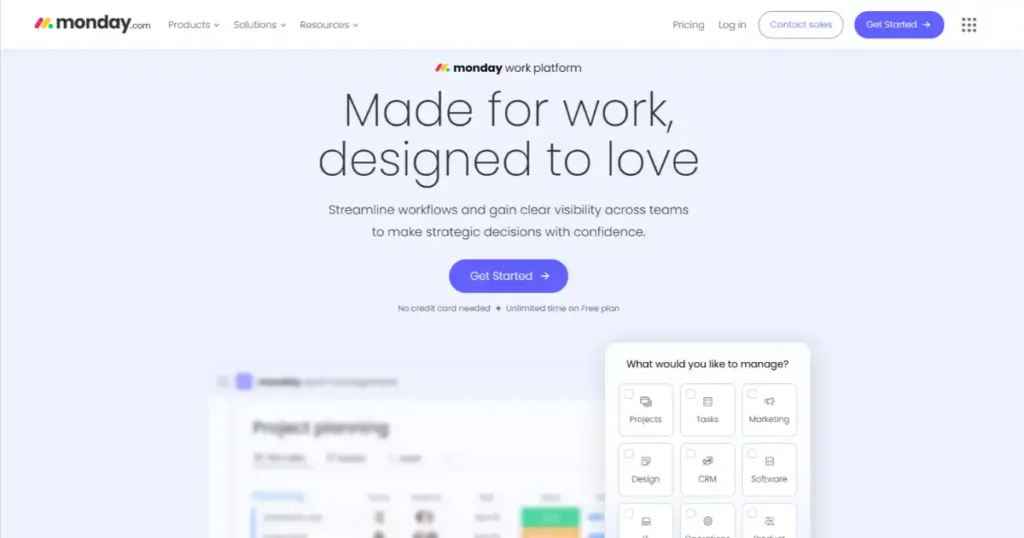
Monday.com offers AI-powered features such as automated task assignment, project forecasting, and real-time data visualization, making it a top choice for project management. These capabilities help teams allocate resources efficiently and gain insights into project progress. Monday.com's AI-driven features enhance decision-making and improve overall project management, making it a valuable tool for digital marketing teams.
Pros
- Automated Task Assignment: Ensures efficient resource allocation.
- Project Forecasting: Provides insights into future project needs.
- Real-Time Visualization: Offers clear views of project data.
Cons
- Cost: Can be expensive for larger teams.
- Learning Curve: Advanced features may require time to master.
AI tools for video marketing and editing
Synthesia
Synthesia's AI technology allows you to create realistic, AI-generated videos with avatars or real human presenters.
Synthesia is a cutting-edge AI tool that enables the creation of realistic, AI-generated videos featuring avatars or real human presenters. As one of the best AI tools for digital marketing, Synthesia simplifies video production by allowing users to generate professional-quality videos without the need for extensive filming or editing. Its AI technology can produce videos in multiple languages, making it ideal for global marketing campaigns. This tool is particularly useful for creating training videos, product demonstrations, and personalized marketing content.
Pros
- Realistic AI-Generated Videos: Offers high-quality video production with minimal effort.
- Multilingual Capabilities: Supports video creation in various languages.
- Cost-Effective: Reduces the need for expensive filming and editing resources.
Cons
- Limited Customization: Avatars may lack the personal touch of live presenters.
- Subscription Costs: Can be pricey for small businesses or infrequent users.
Lumen5
Lumen5 uses AI to automatically generate engaging videos from text-based content, making video creation more accessible and efficient.
Lumen5 leverages AI to transform text-based content into engaging videos, making video creation more accessible and efficient. This tool is perfect for marketers looking to repurpose blog posts, articles, or social media content into video format. Lumen5's AI automatically selects relevant images, video clips, and music to match the text, streamlining the video production process. It's one of the best AI tools for digital marketing, especially for content creators aiming to enhance their visual storytelling.
Pros
- Automated Video Creation: Simplifies the process of turning text into video.
- User-Friendly Interface: Easy to use, even for those with no video editing experience.
- Extensive Media Library: Offers a wide range of stock images and video clips.
Cons
- Limited Advanced Editing: May not satisfy users needing complex video edits.
- AI-Generated Content: Might require manual adjustments for perfect alignment.
Adobe Premiere Pro
Adobe's AI-powered features in Premiere Pro include automated video editing, color grading, and audio enhancement, streamlining the video production process.
Adobe Premiere Pro is a professional-grade video editing software that incorporates AI-powered features to streamline the video production process. Its AI capabilities include automated video editing, color grading, and audio enhancement, which help editors save time and improve the quality of their projects. Premiere Pro's AI-driven tools make it one of the best AI tools for digital marketing, particularly for teams that require high-quality video content for campaigns.
Pros
- Advanced Editing Features: Offers professional-grade tools for video production.
- AI-Enhanced Workflow: Automates tedious tasks like color grading and audio enhancement.
- Integration with Adobe Suite: Seamlessly works with other Adobe products.
Cons
- Steep Learning Curve: Requires time to master its extensive features.
- Subscription Model: Can be costly for individual users or small teams.
AI tools for influencer marketing and brand collaboration
Traackr
Traackr's AI-powered platform helps identify and connect with relevant influencers, monitor campaigns, and measure influencer marketing performance.
Traackr is an AI-powered platform designed to enhance influencer marketing by helping brands identify and connect with relevant influencers. It offers tools to monitor campaigns and measure influencer marketing performance, making it one of the best AI tools for digital marketing in this niche. Traackr's AI capabilities streamline the process of finding influencers who align with a brand's values and target audience, ensuring more effective and authentic collaborations. Additionally, its performance measurement tools provide insights into campaign success, allowing marketers to refine their strategies for better results.
Pros
- Influencer Identification: Efficiently finds influencers that match brand objectives.
- Campaign Monitoring: Provides real-time insights into influencer activities.
- Performance Metrics: Offers detailed analytics to assess campaign impact.
Cons
- Cost: May be pricey for smaller brands or startups.
- Complexity: Requires some expertise to fully utilize its features.
Upfluence
Upfluence leverages AI to discover and vet influencers, manage campaigns, and analyze campaign performance across various social media platforms.
Upfluence leverages AI to discover and vet influencers, manage campaigns, and analyze performance across various social media platforms. This tool is ideal for brands looking to streamline their influencer marketing efforts by automating the discovery process and ensuring that chosen influencers align with campaign goals. Upfluence's AI-driven analytics provide valuable insights into campaign performance, helping marketers optimize their strategies and maximize ROI.
Pros
- Comprehensive Influencer Discovery: Uses AI to find and evaluate potential influencers.
- Campaign Management Tools: Simplifies the process of running influencer campaigns.
- Performance Analysis: Offers detailed insights into campaign success.
Cons
- Pricing: Can be expensive for smaller businesses.
- Learning Curve: May require time to master its full capabilities.
GRIN
GRIN's AI capabilities include influencer discovery, campaign management, and performance tracking, making influencer marketing more efficient and effective.
GRIN is a robust influencer marketing platform with AI capabilities that include influencer discovery, campaign management, and performance tracking. It is designed to make influencer marketing more efficient and effective by automating key processes. GRIN's AI tools help brands identify the right influencers, manage campaigns seamlessly, and track performance metrics to ensure successful outcomes. This makes it a valuable tool for marketers looking to enhance their influencer marketing strategies.
Pros
- Efficient Influencer Discovery: AI helps find influencers that align with brand goals.
- Seamless Campaign Management: Streamlines the process of managing influencer collaborations.
- Comprehensive Performance Tracking: Provides insights into campaign effectiveness.
Cons
- Cost: May be a significant investment for smaller companies.
- Integration Complexity: Requires setup and integration with existing marketing systems.
You May Also Like: 11 Best AI Resume Writer Tools
AI tools for customer relationship management (CRM)
Salesforce Einstein
Mentioned earlier for its data analytics and sales capabilities, Salesforce Einstein also offers AI-powered CRM features like intelligent lead scoring and personalized customer recommendations.
Salesforce Einstein is an AI-powered CRM platform that enhances data analytics and sales capabilities with features like intelligent lead scoring and personalized customer recommendations. As one of the best AI tools for digital marketing, Salesforce Einstein helps businesses prioritize leads based on their likelihood to convert, ensuring sales teams focus on the most promising opportunities. Its personalized customer recommendations enhance customer engagement by tailoring interactions to individual preferences and behaviors, ultimately driving better sales outcomes.
Pros
- Intelligent Lead Scoring: Prioritizes leads based on conversion potential.
- Personalized Recommendations: Enhances customer engagement with tailored interactions.
- Comprehensive CRM Integration: Seamlessly integrates with Salesforce's robust CRM suite.
Cons
- Cost: Can be expensive for small businesses.
- Complexity: Requires expertise to fully leverage its capabilities.
HubSpot CRM
HubSpot's AI-powered CRM features include lead scoring, predictive lead scoring, and automated data entry for a more streamlined customer management process.
HubSpot CRM offers AI-powered features such as lead scoring, predictive lead scoring, and automated data entry, streamlining the customer management process. These capabilities help sales teams identify high-potential leads and reduce manual data entry tasks, allowing them to focus on building relationships and closing deals. HubSpot's AI-driven insights provide valuable data for making informed decisions, making it a top choice for businesses looking to enhance their CRM strategies.
Pros
- Predictive Lead Scoring: Identifies high-potential leads efficiently.
- Automated Data Entry: Reduces manual workload for sales teams.
- User-Friendly Interface: Easy to use and integrates well with other HubSpot tools.
Cons
- Limited Advanced Features: Some advanced AI capabilities may require higher-tier plans.
- Integration Challenges: May require additional setup for complex integrations.
Zoho CRM
Zoho CRM incorporates AI capabilities such as intelligent lead scoring, automated data entry, and predictive analytics for better customer insights.
Zoho CRM incorporates AI capabilities such as intelligent lead scoring, automated data entry, and predictive analytics to provide better customer insights. These features help businesses prioritize leads, streamline data management, and gain valuable insights into customer behavior and trends. Zoho CRM's AI-driven tools make it a valuable asset for companies looking to improve their customer relationship management and drive sales growth.
Pros
- Intelligent Lead Scoring: Helps prioritize and manage leads effectively.
- Predictive Analytics: Provides insights into customer behavior and trends.
- Cost-Effective: Offers a range of pricing plans suitable for different business sizes.
Cons
- Learning Curve: May require time to fully utilize its features.
- Customization Limitations: Some customization options may be limited in lower-tier plans.
AI tools for A/B testing and conversion rate optimization
Optimizely
Mentioned earlier for its sales and conversion optimization capabilities, Optimizely also offers AI-powered A/B testing and personalization features for improved website and app experiences.
Optimizely is a powerful platform known for its sales and conversion optimization capabilities, enhanced by AI-powered A/B testing and personalization features. These tools help businesses improve website and app experiences by allowing them to test different versions of their digital content and personalize user interactions based on data-driven insights. Optimizely's AI capabilities ensure that businesses can deliver tailored experiences to their audiences, ultimately boosting engagement and conversion rates.
Pros
- AI-Powered A/B Testing: Enables effective testing of different content versions.
- Personalization Features: Tailors user experiences for better engagement.
- Comprehensive Analytics: Provides detailed insights into user behavior.
Cons
- Cost: Can be expensive for smaller businesses.
- Complexity: Requires expertise to fully utilize its advanced features.
Google Optimize
Google Optimize leverages AI to provide personalized experiences, automated A/B testing, and real-time experiment analysis for better conversion rates.
Google Optimize leverages AI to provide personalized experiences, automated A/B testing, and real-time experiment analysis, all aimed at improving conversion rates. As part of the Google Marketing Platform, it integrates seamlessly with other Google tools, offering a comprehensive solution for businesses looking to enhance their digital marketing strategies. Google Optimize's AI-driven features allow marketers to test and refine their content, ensuring that they deliver the most effective experiences to their audiences.
Pros
- Seamless Integration: Works well with other Google tools.
- Automated A/B Testing: Simplifies the process of testing content variations.
- Real-Time Analysis: Provides immediate insights into experiment results.
Cons
- Limited Advanced Features: Some features may be restricted in the free version.
- Learning Curve: Requires time to master its capabilities.
VWO
VWO's AI-powered features include intelligent traffic allocation, automated targeting, and personalized recommendations for more effective A/B testing and optimization.
VWO offers AI-powered features such as intelligent traffic allocation, automated targeting, and personalized recommendations, making it a top choice for A/B testing and optimization. These capabilities help businesses allocate traffic efficiently, target the right audience segments, and deliver personalized experiences that enhance user engagement. VWO's AI-driven tools ensure that businesses can optimize their digital content effectively, leading to improved conversion rates and overall performance.
Pros
- Intelligent Traffic Allocation: Optimizes traffic distribution for better results.
- Automated Targeting: Ensures content reaches the right audience.
- Personalized Recommendations: Enhances user experiences with tailored content.
Cons
- Pricing: Can be costly for smaller teams.
- Complexity: Advanced features may require time to learn and implement.
AI tools for mobile marketing and app development
Google Firebase
Google Firebase offers AI-powered features like predictive analytics, automated app testing, and personalized push notifications for better mobile app engagement and retention.
Google Firebase is a comprehensive platform that offers AI-powered features designed to enhance mobile app engagement and retention. Its predictive analytics provide insights into user behavior, allowing developers to anticipate user needs and tailor app experiences accordingly. Firebase also includes automated app testing, which helps ensure app quality and performance, and personalized push notifications that engage users with relevant content, boosting retention rates.
Pros
- Predictive Analytics: Offers insights into user behavior for better engagement.
- Automated App Testing: Ensures app quality and performance.
- Personalized Push Notifications: Enhances user engagement with tailored content.
Cons
- Complexity: May require technical expertise to fully utilize.
- Integration Challenges: Can be complex to integrate with existing systems.
Appsee
Appsee's AI capabilities include user behavior analytics, automated user session recordings, and in-app messaging for improved mobile app optimization and user experience.
Appsee provides AI capabilities focused on user behavior analytics, automated user session recordings, and in-app messaging to optimize mobile app performance and user experience. By analyzing user interactions, Appsee helps developers understand how users navigate their apps, identifying areas for improvement. Its automated session recordings offer a visual representation of user behavior, while in-app messaging enhances communication with users, improving overall app satisfaction.
Pros
- User Behavior Analytics: Provides deep insights into user interactions.
- Automated Session Recordings: Visualizes user behavior for better understanding.
- In-App Messaging: Enhances user communication and engagement.
Cons
- Pricing: Can be costly for smaller developers.
- Data Overload: May provide more data than necessary for some teams.
Leanplum
Leanplum's AI-powered platform provides personalized messaging, predictive analytics, and automated A/B testing for more effective mobile marketing and app engagement.
Leanplum's AI-powered platform focuses on personalized messaging, predictive analytics, and automated A/B testing to enhance mobile marketing and app engagement. It allows marketers to deliver targeted messages based on user behavior, improving engagement and conversion rates. Leanplum's predictive analytics help anticipate user actions, while its automated A/B testing optimizes marketing strategies for better outcomes.
Pros
- Personalized Messaging: Delivers targeted content to enhance engagement.
- Predictive Analytics: Anticipates user actions for better marketing strategies.
- Automated A/B Testing: Optimizes campaigns for improved results.
Cons
- Learning Curve: May require time to master its features.
- Cost: Can be expensive for smaller teams or startups.
AI tools for marketing automation and workflow management
HubSpot Marketing Hub
HubSpot's AI-powered Marketing Hub offers automated lead nurturing, email personalization, and predictive lead scoring for more efficient and effective marketing campaigns.
HubSpot's AI-powered Marketing Hub is designed to enhance marketing campaigns through automated lead nurturing, email personalization, and predictive lead scoring. These features help marketers efficiently manage and engage leads by delivering personalized content that resonates with their audience. HubSpot's AI-driven tools streamline the marketing process, allowing teams to focus on strategy and creativity while the platform handles the automation and data analysis.
Pros
- Automated Lead Nurturing: Streamlines the process of engaging and converting leads.
- Email Personalization: Enhances engagement with tailored content.
- Predictive Lead Scoring: Identifies high-potential leads for targeted marketing efforts.
Cons
- Pricing: Can be costly for smaller businesses or startups.
- Complexity: May require time to fully leverage its capabilities.
Marketo
Marketo's AI capabilities include predictive content recommendations, automated lead scoring, and real-time campaign optimization for improved marketing automation and workflow management.
Marketo is a robust marketing automation platform with AI capabilities that include predictive content recommendations, automated lead scoring, and real-time campaign optimization. These features enable marketers to deliver the right content to the right audience at the right time, improving engagement and conversion rates. Marketo's AI-driven tools help streamline workflow management, allowing marketing teams to focus on strategic initiatives while the platform handles the automation.
Pros
- Predictive Content Recommendations: Delivers relevant content to enhance engagement.
- Automated Lead Scoring: Prioritizes leads based on conversion potential.
- Real-Time Campaign Optimization: Adjusts strategies for improved outcomes.
Cons
- Cost: May be expensive for smaller teams.
- Learning Curve: Requires expertise to fully utilize its advanced features.
Pardot
Pardot's AI-powered features include automated lead scoring, personalized content recommendations, and intelligent campaign insights for streamlined marketing automation and lead management.
Pardot, part of Salesforce, offers AI-powered features such as automated lead scoring, personalized content recommendations, and intelligent campaign insights. These tools help streamline marketing automation and lead management, ensuring that marketers can efficiently engage and convert leads. Pardot's AI capabilities provide valuable insights into campaign performance, allowing teams to make data-driven decisions and optimize their marketing strategies.
Pros
- Automated Lead Scoring: Efficiently prioritizes leads for better management.
- Personalized Content Recommendations: Enhances engagement with tailored messaging.
- Intelligent Campaign Insights: Provides data-driven insights for strategy optimization.
Cons
- Integration Complexity: May require setup and integration with existing systems.
- Pricing: Can be costly for smaller businesses or startups.
Conclusion: How to choose the right AI tools for your digital marketing goals
As we've explored the vast array of AI tools available for digital marketing, it's essential to understand that no single tool can address all your needs. The key is to identify the specific areas where you require AI assistance and select the appropriate tools that align with your goals and objectives.
When choosing AI tools for your digital marketing strategy, consider the following factors:
- Specific Needs: Evaluate your current challenges and identify the areas where AI tools can provide the most significant impact, such as content creation, data analysis, or campaign optimization.
- Integration: Ensure that the AI tools you select can seamlessly integrate with your existing marketing technology stack and workflows.
- Scalability: As your business grows, your AI tools should be able to scale and adapt to increasing workloads and data volumes.
- User-Friendliness: Look for AI tools with intuitive interfaces and robust support resources to ensure a smooth adoption and implementation process.
- Budget: Assess the cost of the AI tools against your budget and consider the potential return on investment (ROI) they can provide.
By carefully evaluating your needs and selecting the right AI tools, you can unlock the full potential of digital marketing, streamline processes, and gain a competitive edge in today's data-driven landscape.To take your digital marketing efforts to new heights, sign up for our AI tools consultation service. Our experts will assess your unique needs and recommend the best AI tools tailored to your business goals. Don't miss out on the opportunity to harness the power of AI and stay ahead of the competition. Book your consultation today!



